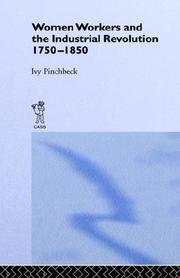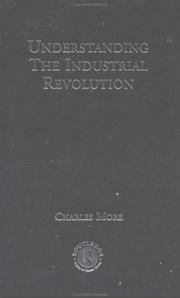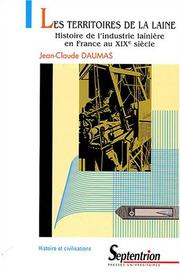| Listing 1 - 10 of 23 | << page >> |
Sort by
|
Book

ISBN: 2869065906 2869062710 Year: 2018 Publisher: Tours : Presses universitaires François-Rabelais,
Abstract | Keywords | Export | Availability | Bookmark
 Loading...
Loading...Choose an application
- Reference Manager
- EndNote
- RefWorks (Direct export to RefWorks)
Nos sociétés modernes n’ont cessé de se questionner sur la place et le sens du travail. Cette très ancienne question est récemment encore réapparue dans le débat public : ce débat concerne la place du travail dans nos vies, le manque de travail pour les uns, la surcharge de travail pour les autres, les formes que revêt celui-ci, plus récemment la nature des transformations de la relation d’emploi et du rapport salarial. Une mise à distance par l’histoire des faits et des idées peut permettre de décentrer notre regard du vécu immédiat pour resituer le débat sur le travail dans l’univers riche et complexe des possibles. Revisiter à ce sujet les auteurs classiques ou plus contemporains, analyser leurs interrogations relatives à l’action, au faire, à l’effort, à l’oeuvre et au travail, est une voie privilégiée pour interroger le devenir de nos sociétés. C’est l’hypothèse que veut valider le présent ouvrage, recueil de contributions d’universitaires et de chercheurs spécialistes de l’histoire de la pensée et des faits économiques et sociaux. La première partie consacrée à l’invention du travail illustre divers aspects de la réalité du travail avant la révolution industrielle, puis réinterprète la pensée de Locke, de Rousseau et des physiocrates. La deuxième partie aborde le double problème de l’aliénation et de l’exploitation, au coeur des réflexions des philosophes et des économistes du xviiie et du xixe siècle. La troisième partie aborde plus largement la question sociale et en particulier les aspects du droit au repos et de l’organisation du marché du travail.
Economics --- History --- philosophie --- économie --- travail --- révolution industrielle --- salariat --- physiocrates

ISBN: 0714613517 9781136936906 1136936904 9780714613512 1138874639 1315031825 9781315031828 9781136936975 9781136937040 9781138874633 1136936971 Year: 1969 Publisher: London : Cass,
Abstract | Keywords | Export | Availability | Bookmark
 Loading...
Loading...Choose an application
- Reference Manager
- EndNote
- RefWorks (Direct export to RefWorks)
First Published in 2004. Routledge is an imprint of Taylor & Francis, an informa company.
Industrial revolution --- Women --- Employment --- Great Britain --- Economic conditions --- Révolution industrielle --- Femmes --- Conditions économiques --- Travail --- Révolution industrielle --- Conditions économiques
Book
ISBN: 9791035103798 2859444157 Year: 2020 Publisher: Paris : Éditions de la Sorbonne,
Abstract | Keywords | Export | Availability | Bookmark
 Loading...
Loading...Choose an application
- Reference Manager
- EndNote
- RefWorks (Direct export to RefWorks)
À la fin du XIXe siècle au moment où la Révolution industrielle fait des États-Unis un pays tourné vers le progrès industriel et technique, un nouvel acteur s'impose sur la scène urbaine : l'ingénieur des travaux publics. Grâce aux équipements qu’il réalise, les métropoles se transforment radicalement. La modernisation des réseaux d’eau et des égouts fait reculer les épidémies, la création d'espaces verts améliore le cadre de vie, tandis que la construction d'ouvrages d'art, comme le pont de Brooklyn à New York, facilite la circulation. L'aptitude à l’innovation des ingénieurs municipaux américains est telle qu'ils deviennent des références en matière de travaux publics, en Amérique, mais aussi en Europe. S'intéresser à leur œuvre permet donc de mieux comprendre comment les États-Unis devienne à la fin du XIXe siècle une puissance technique de premier plan. L'influence de ces ingénieurs ne se limite pas cependant aux seules questions techniques. En effet, en recrutant ces hommes, les métropoles américaines posent les bases d'un gouvernement par l'expertise qui sera largement plébiscité au XXe siècle. On est loin de l'image corrompue qui est généralement associée aux villes à celle époque. En analysant le rôle des ingénieurs municipaux, c'est en fait les réalités urbaines de la fin du XIXe siècle que nous cernons mieux.
Municipal engineering --- Public works --- City planning --- Municipal engineers --- Engineers --- Engineering, Municipal --- Engineering --- ingénieur --- métropole américaine --- Révolution industrielle --- ingénieur des travaux publics --- modernisation --- travail public

ISBN: 0415184045 0415184053 9786610354436 020319019X 0203136977 1280354437 1134670087 9780203190197 9780203136973 9780415184045 9780415184052 9781134670086 9781134670031 1134670036 9781134670079 1134670079 Year: 2000 Publisher: London New York Routledge
Abstract | Keywords | Export | Availability | Bookmark
 Loading...
Loading...Choose an application
- Reference Manager
- EndNote
- RefWorks (Direct export to RefWorks)
Each aspect of the Industrial Revolution in Britain is discussed in depth, focusing on the important debates and reviewing the most recent research.
Industrial revolution --- Révolution industrielle --- Industrial revolution. --- AA / International- internationaal --- 331.12 --- 331.100 --- Geschiedenis van de industrie. --- Economische geschiedenis: algemeenheden. --- Révolution industrielle --- Revolution, Industrial --- Economic history --- Social history --- Economische geschiedenis: algemeenheden --- Geschiedenis van de industrie
Book
ISBN: 9781474286183 1474286186 9781474286176 1474286178 9781474286169 147428616X 9781474286466 1474286461 1474286194 Year: 2017 Publisher: [London] : Bloomsbury Academic,
Abstract | Keywords | Export | Availability | Bookmark
 Loading...
Loading...Choose an application
- Reference Manager
- EndNote
- RefWorks (Direct export to RefWorks)
"The British Industrial Revolution has long been seen as the spark for modern, global industrialization and sustained economic growth. Indeed the origins of economic history, as a discipline, lie in 19th-century European and North American attempts to understand the foundation of this process. In this book, William J. Ashworth questions some of the orthodoxies concerning the history of the industrial revolution and offers a deep and detailed reassessment of the subject that focuses on the State and its role in the development of key British manufactures. In particular, he explores the role of State regulation and protectionism in nurturing Britain's negligible early manufacturing base. Taking a long view, from the mid 17th century through to the 19th century, the analysis weaves together a vast range of factors to provide one of the fullest analyses of the industrial revolution, and one that places it firmly within a global context, showing that the Industrial Revolution was merely a short moment within a much larger and longer global trajectory. This book is an important intervention in the debates surrounding modern industrial history will be essential reading for anyone interested in global and comparative economic history and the history of globalization."--Bloomsbury Publishing.
E-books --- BUSINESS & ECONOMICS --- Economic history. --- General & world history. --- Industrial revolution. --- Industrialisation & industrial history. --- Modern history to 20th century: c 1700 to c 1900. --- Industries --- General. --- Révolution industrielle --- Revolution, Industrial --- Economic history --- Social history --- Industrial revolution
Book
ISBN: 2020006510 9782020006514 Year: 1971 Volume: H6 Publisher: Paris : Editions du Seuil,
Abstract | Keywords | Export | Availability | Bookmark
 Loading...
Loading...Choose an application
- Reference Manager
- EndNote
- RefWorks (Direct export to RefWorks)
Bibliotheek François Vercammen
History --- History of the Netherlands --- anno 1700-1799 --- anno 1800-1899 --- Economic history --- Industrialization --- Industries --- Histoire économique --- Industrialisation --- Industrie --- Histoire --- Economie --- Sociologie --- 338 <09> --- 93 --- 949.2 --- Economische geschiedenis --- Geschiedenis --- Geschiedenis van Nederland --- 338 <09> Economische geschiedenis --- Histoire économique --- Economic history - 1750-1918 --- Histoire economique --- Revolution industrielle --- 18e-19e siecles
Book
ISBN: 0198282737 Year: 1978 Publisher: Oxford : Clarendon Press,
Abstract | Keywords | Export | Availability | Bookmark
 Loading...
Loading...Choose an application
- Reference Manager
- EndNote
- RefWorks (Direct export to RefWorks)
History of the United Kingdom and Ireland --- Heat engines. Steam engines --- anno 1800-1899 --- Industrialization --- -Steam-engines --- -Engines --- Industrial development --- Economic development --- Economic policy --- Deindustrialization --- History --- Steam-engines --- History. --- -History --- Revolution industrielle --- Grande-bretagne --- Industrie --- Machines a vapeur --- Angleterre --- Histoire --- Conditions economiques --- 18e-19e siecles

ISBN: 2859398120 9782859398125 2757422421 Year: 2004 Volume: *36 Publisher: Villeneuve-d'Ascq : Presses universitaires du Septentrion,
Abstract | Keywords | Export | Availability | Bookmark
 Loading...
Loading...Choose an application
- Reference Manager
- EndNote
- RefWorks (Direct export to RefWorks)
En un siècle, Roubaix et Tourcoing se sont transformées de petits bourgs ruraux animés par le battement des métiers à bras en un gigantesque complexe industriel. Comment expliquer que le « Manchester français », alors même que rien ne l’y prédisposait, ait réussi à dominer toute la branche, quand les autres centres lainiers, souvent plus anciens et plus prestigieux, étaient impuissants à enrayer leur déclassement ? Poser cette question cruciale, c’est renoncer à faire une histoire de l’industrie lainière « par en haut » pour étudier les trajectoires des territoires qui la composent et forment autant demondes industriels originaux. Les performances de Roubaix ne s’expliquent pas seulement par la qualité de ses tissus, la puissance de ses entreprises et l’abondance de sa main-d’œuvre mais aussi par l’ambition dynastique, la forte solidarité et le projet industrialiste de son patronat qui a vraisemblablement constitué son avantage comparatif le plus important.
Wool industry --- Laine --- History --- Industrie --- Histoire --- 677 <09> <44> --- Textile industry--Geschiedenis van ...--Frankrijk --- 677 <09> <44> Textile industry--Geschiedenis van ...--Frankrijk --- Wool-growing industry --- Wool trade and industry --- Woolgrowing industry --- Sheep industry --- histoire --- industrie --- laine --- révolution industrielle --- textile --- Industrie et commerce --- France (nord) --- 19e siècle --- 19e siècle
Book

ISBN: 0691075956 1322883807 0691615217 140087145X 0691100667 0691642729 9781322883809 9781400871452 9780691075952 Year: 2015 Publisher: Princeton, NJ
Abstract | Keywords | Export | Availability | Bookmark
 Loading...
Loading...Choose an application
- Reference Manager
- EndNote
- RefWorks (Direct export to RefWorks)
The nine papers in this volume examine the historical experience of particular populations in Western Europe and North America in a search for the processes that change fertility patterns. The contributors' findings enable them to reevaluate some of the conflicting hypotheses that have been advanced for these changes. The authors stress the effects on fertility of changing mortality. Several theoretical discussions emphasize the importance both of the turnover in adult positions due to mortality and of the highly variable life expectancy of children. The empirical analyses consistently reveal strong associations between levels of fertility and mortality. On the other hand, some essays question whether variations in opportunities to marry acted as quite the regulator that Malthus and many after him have thought. In both preindustrial and industrial populations, fertility regulation within marriage emerges as the primary mechanism by which adjustment occurred.Originally published in 1978.The Princeton Legacy Library uses the latest print-on-demand technology to again make available previously out-of-print books from the distinguished backlist of Princeton University Press. These editions preserve the original texts of these important books while presenting them in durable paperback and hardcover editions. The goal of the Princeton Legacy Library is to vastly increase access to the rich scholarly heritage found in the thousands of books published by Princeton University Press since its founding in 1905.
Fecondite --- -#GROL:MEDO-314.3 --- Fertility --- Demography --- Socioeconomic Factors --- Mortality --- Fertility, Human --- congresses --- history --- congresses. --- Congresses --- Congrès --- Congresses. --- Human fertility --- Natality --- Human reproduction --- Infertility --- Fertility, Human. --- Geografie --- Sociale geografie --- Bevolking. --- Fertility, Human - Congresses --- -Congresses --- FECONDITE HUMAINE --- DEMOGRAPHIE --- REVOLUTION INDUSTRIELLE --- POPULATION --- EUROPE --- FRANCE --- HISTOIRE --- RECHERCHE --- 18E-20E SIECLES --- 18E-19E SIECLES --- Population
Book
ISBN: 9780521847568 9780511780455 9780521248969 9780511932434 051193243X 9780511927256 0511927258 9780511929755 0511929757 0511780451 0511924712 9780511924712 0521847567 0521248965 110720982X 0511852282 1282918656 9786612918650 0511931093 Year: 2011 Publisher: Cambridge, UK New York Melbourne : Cambridge University Press,
Abstract | Keywords | Export | Availability | Bookmark
 Loading...
Loading...Choose an application
- Reference Manager
- EndNote
- RefWorks (Direct export to RefWorks)
This is a unique account of working-class childhood during the British industrial revolution, first published in 2010. Using more than 600 autobiographies written by working men of the eighteenth and nineteenth centuries Jane Humphries illuminates working-class childhood in contexts untouched by conventional sources and facilitates estimates of age at starting work, social mobility, the extent of apprenticeship and the duration of schooling. The classic era of industrialisation, 1790-1850, apparently saw an upsurge in child labour. While the memoirs implicate mechanisation and the division of labour in this increase, they also show that fatherlessness and large subsets, common in these turbulent, high-mortality and high-fertility times, often cast children as partners and supports for mothers struggling to hold families together. The book offers unprecedented insights into child labour, family life, careers and schooling. Its images of suffering, stoicism and occasional childish pleasures put the humanity back into economic history and the trauma back into the industrial revolution.
Child labor --- Childhood --- Industrial revolution --- History. --- thuisarbeid --- industriële revolutie --- huisarbeid --- History of the United Kingdom and Ireland --- anno 1700-1799 --- anno 1800-1899 --- Children --- Employment of children --- Labor --- Age and employment --- Kids (Children) --- Pedology (Child study) --- Youngsters --- Age groups --- Families --- Life cycle, Human --- History --- Employment --- kinderarbeid --- Groot-Brittannië --- E-books --- Arts and Humanities --- Enfants --- Révolution industrielle --- Travail --- Grande-Bretagne --- Histoire --- Groot-Brittannië.
| Listing 1 - 10 of 23 | << page >> |
Sort by
|

 Search
Search Feedback
Feedback About UniCat
About UniCat  Help
Help News
News